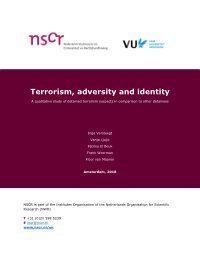By Inge Versteegt Vanja Ljujic, Fatima El Bouk, Frank Weerman and Floor van Maaren
In the last two decades, interest in terrorism and extremism has increased tremendously, in particular after the events of 9/11, the rise of Al Qaeda and I.S. Several countries in Europe were recently confronted with large scale attacks. This is only part of a worldwide variety in attacks from different backgrounds and conflicts. Jihadist extremism and terrorism is at the fore of the public debate and attention, but there have also been many attacks from other religious and political backgrounds, for example right-wing extremist attacks on mosques, synagogues and migrants. Due to the increased public and political concern for terrorism since the beginning of the 21st century, there has been a growing research interest into this theme (e.g., De Graaf, 2017, Sageman 2008; Horgan, 2012). This has improved our knowledge and insights on the subject. However, many studies on terrorism are based on similar, limited sources that are often reused. As a result the theoretical debate on terrorism is not always at par with the availability of reliable empirical research material (Borum, 2011). Although various insights about the underlying mechanisms of needs and motivations for involvement in terrorism have been discovered (Horgan, 2012), much is still unclear. What we lack in particular is an understanding of the factors that increase the likelihood of resorting to violent extremism in people who have the same backgrounds and encounter similar experiences as people who do not become involved in terrorism.
Amsterdam: Netherlands Institute for the Study of Crime and Law Enforcement, 2018. 155p.


